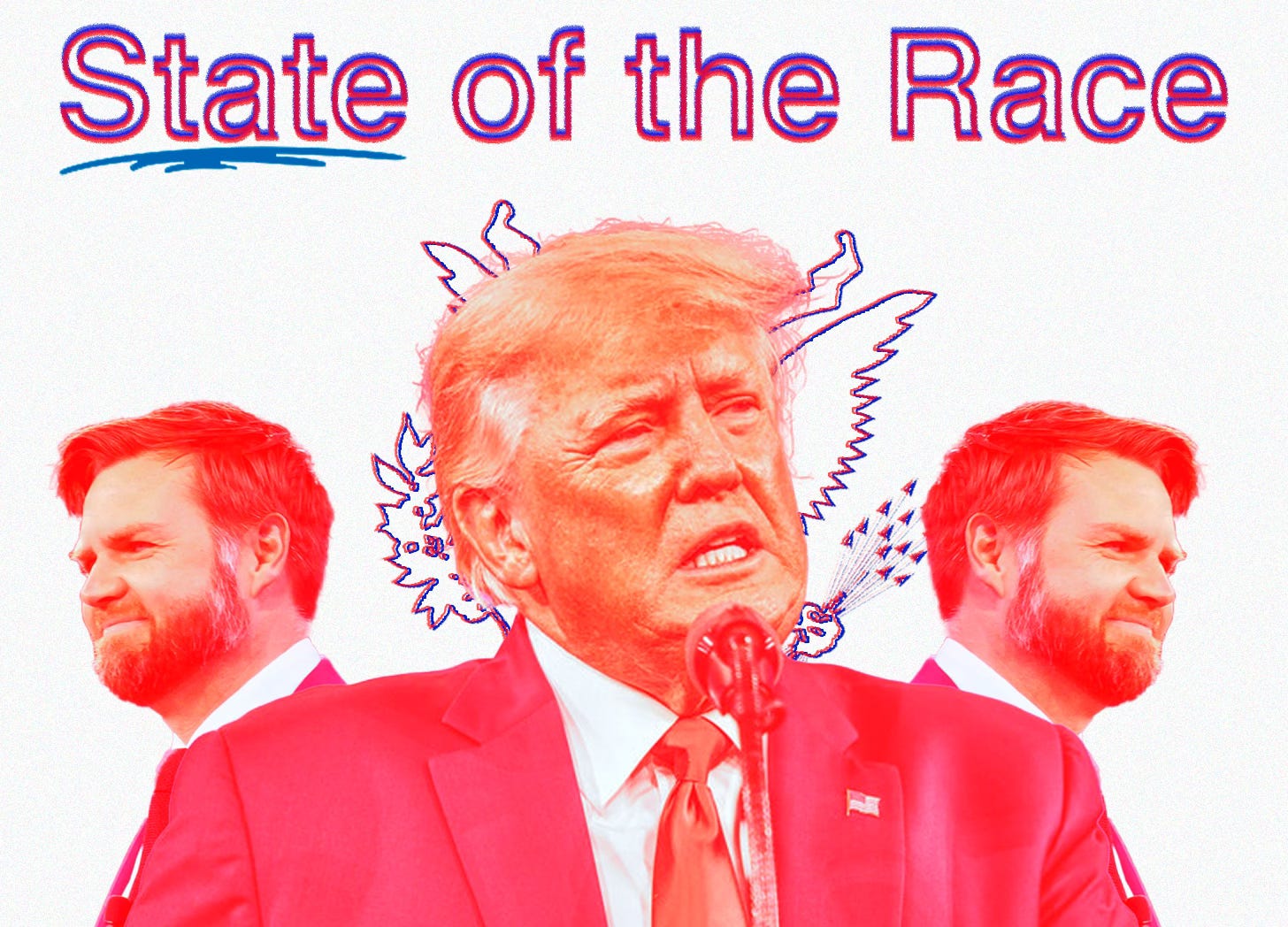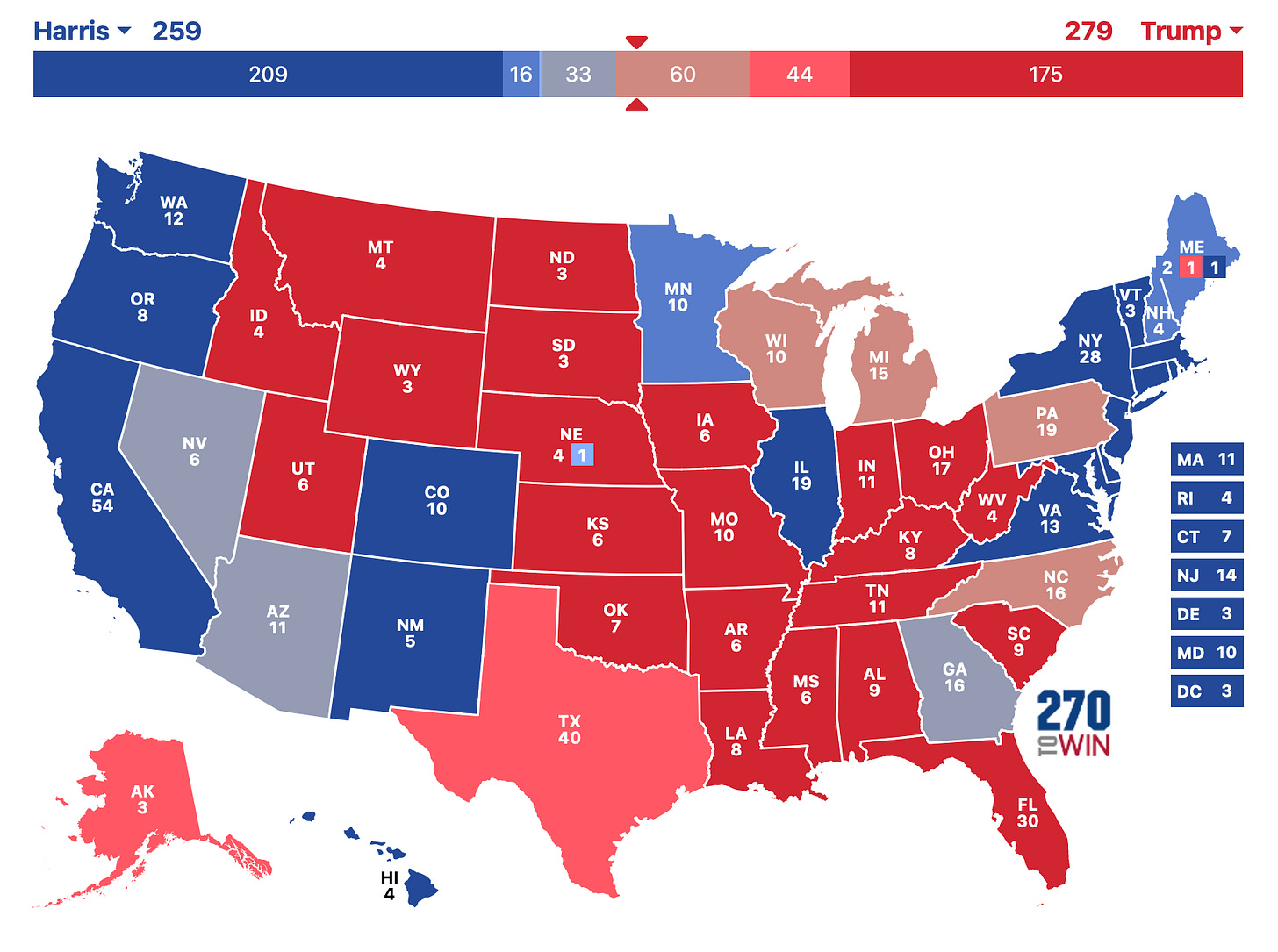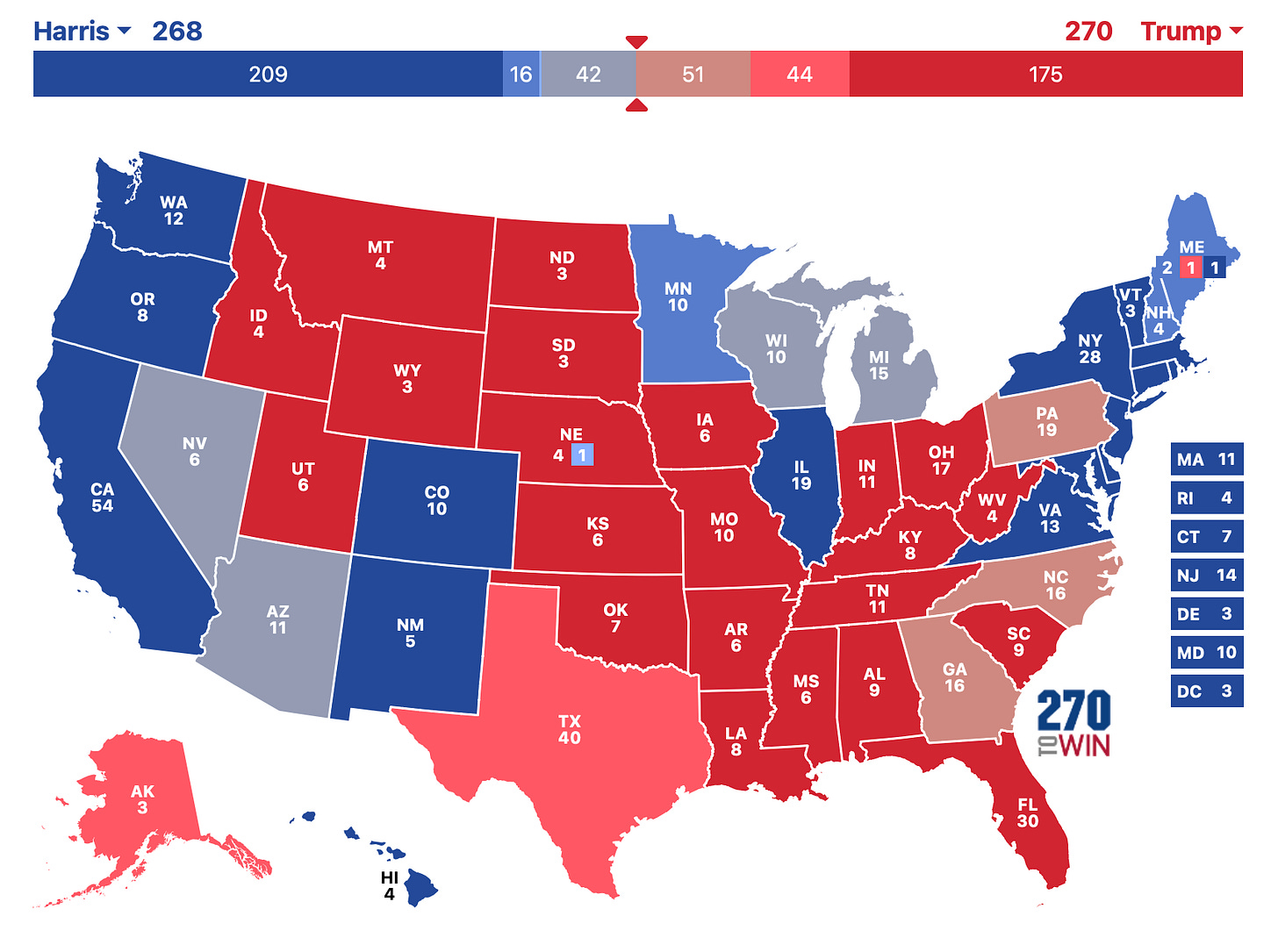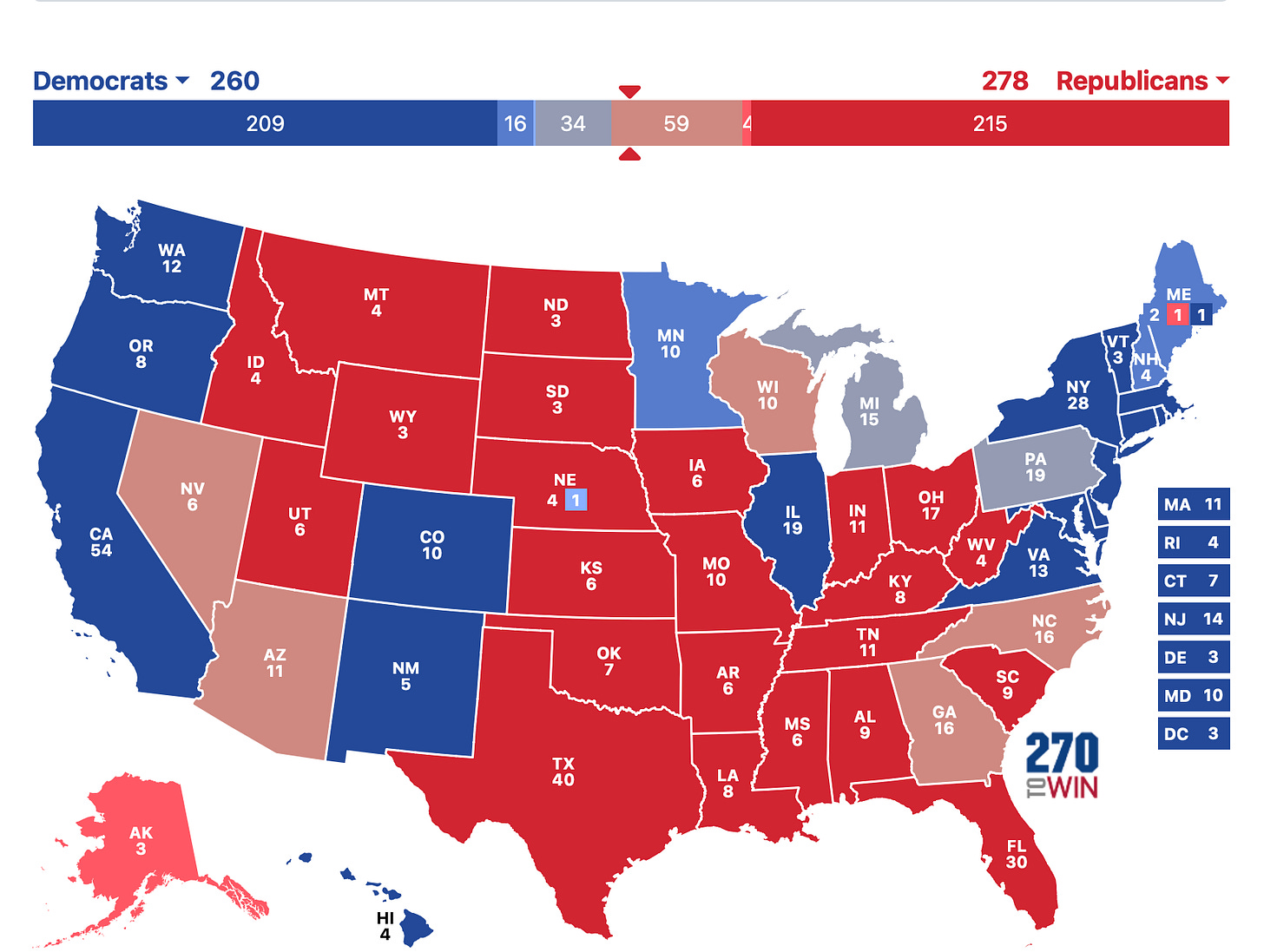Should Trump Be The Favorite?
Playing devil's advocate for a Trump win is easier than it seems
I had originally written this article to summarize and give my thoughts on how Kamala’s surge in the polls was:
A. Very promising
B. A refutation of many of Biden-world’s arguments on the President’s candidacy
C. A reflection that Trump is not a good candidate and has gotten extraordinarily lucky
However, this article has been written thousands of times by now, and I see no real need to play into this. I want to talk about the other guy, the candidate who still has around a fifty percent chance of winning the Presidency. The whiplash of Trump’s deflation in the polls has perhaps led to an overreaction to the reality of the state of Trump 2024. The increasingly common belief that Trump is, in fact, a weak candidate is, to me, incredibly and perhaps completely flawed. With this being said, let me adorn my “Devil’s Advocate” pin and explain why Donald Trump could, and maybe even should, be considered the favorite in 2024.
A core argument for pushing Biden to drop out was that Trump is not an inherently strong candidate and that there would, at minimum, be a material boost to Democrats' chances of victory should they swap Biden. This was a useful rhetorical tool to get Biden to drop out, but the acceptance of the idea that Trump is a bad candidate is, to me, a step too far. People have confused Trump the Candidate with Trump the President. Trump the President was a deeply unpopular, chaotic figure who did not know how to govern in any productive manner. From 2017 to 2019, we nearly went to nuclear war with North Korea, actually went into a trade war with China, and shut down the Government multiple times (among many other transgressions). For any other President, this would be a death sentence and lead to a surefire rejection during the next Presidential election. For Trump? Smooth sailing.
Then, 2020 happened. COVID quite literally plagued the nation, and Trump’s inability to garner any real response led to extreme discontent from the electorate. Add on top of this riots in major American cities and Trump’s disdain for peaceful protestors, and it looked to be a knockout blow. Biden led by an average of 4.5% in the battleground states and was closer to flipping Iowa and Ohio than losing Wisconsin. Still, even with all of these scandals and disasters, Trump still nearly won! If Trump was truly a weak candidate who got lucky by facing Clinton in 2016, he would have performed to the expectation of polling in 2020. He didn’t. While his defeat may have banished him from the political sphere for a few years, it didn’t stop the spread of Trumpism from infecting winnable down-ballot races in 2022.
Even with the repeal of Roe altering the normal midterm dynamics at play, 2022 was still the Republicans' race to lose. All they had to do was run moderate Republican candidates who could soften attacks on abortion and hone in on the economy and crime. Instead, they nominated people like Blake Masters and Doug Mastriano and lost winnable races. So how could Trump be such a strong candidate but Trumpism so weak? His ability to articulate his insane and unpopular policies in a way that disarms so much criticism. If Trump was truly a weak candidate, then the only way to explain his unprecedented electoral success in 2016 would be that his policies are popular. 2022 showed they aren’t.
We’re now in 2024. Trump eviscerated the Floridian prince who was promised, Ron DeSantis, and a field of other hopefuls for the nomination. It didn’t matter that Nikki Haley polled far ahead of Trump against Biden, or that DeSantis had the support of the traditional conservative media apparatus. Trump still rolled through the primary and set his sights on Biden and a vulnerable Democratic party. In the process, he relegated Haley into obscurity for the rest of her political career, and probably did the same to DeSantis (although DeSantis’s issues are very fixable). Again, a normal failed Republican nominee whose disciples cost the party multiple Senate seats and governors' mansions would falter. There isn’t a figure in the Democratic party who could manage to do what Trump has done over the last eight years.
I don’t really care to review what happened with Trump and Biden. That has been covered to death, and it doesn’t help my thesis about Trump as a candidate. In truth, Biden dropping out was probably destined to happen no matter the Republican candidate. Biden would also be polling behind DeSantis or Haley, ask for an early debate to gain momentum, and then tumble out of the race. Biden was a much weaker candidate than he was in 2020, and unlike when Trump was an incumbent, Biden was not given the benefit of the doubt from the electorate. Any Republican was going to destroy Biden because he was a weaker-than-average candidate who simultaneously faced an environment where voters across the world have rejected incumbency.
Now, onto the present day. Harris’s momentum has faltered a bit, and her convention bump is an open question (because she experienced so much positive media attention over the last month). The likelist scenario would leave Harris polling ahead of Trump by around 1.2% in the battleground states if this surge fades (big if). An important but by no means unbeatable lead. So, how does Trump win this, and more importantly, why should he be the favorite? Well, for starters, Trump has overperformed in the two elections where his name has been on the ballot. I don’t think that’s a fair argument (or an interesting one!), so I won’t base my entire thesis on it, but it needs to be noted. My main belief in a Trump win hinges on the idea that his campaign operation will hone in on Harris as election day approaches and that many of his core campaign themes are going to be more prescient the closer we get to November.
I will be the first to admit that Trump committed one of the most serious blunders in politics: he allowed Harris time to define herself. Trump did attack Kamala, but he attacked her on issues like race and gender, which both didn’t land and rallied the Democratic base even more. So shouldn’t Harris’s political brand identity be all but locked up? Not quite. Harris has spent the last month building her vision of America more based on vibes and less on specific policy. This is good for building up support quickly (and her polling has reflected this), but it also leaves her more vulnerable than usual to attacks from the GOP. Surface-level slogans like “We’re not going back” poll well with moderate voters because there isn’t anything specific to disagree with. Connecting Harris with the border and with California, rightly or wrongly, cuts deeper than what Harris has done with her time.
Harris is fully bought into this vibes-based operation, a theory that was reinforced by her selection of do-no-harm Walz. Don’t get me wrong, picking Walz was not a bad idea and generally doesn’t move the needle much. However, I still think that the arguments against Shapiro were based more on ideology than real electoral fact. Saying that Shapiro was “too ambitious” or “distracted from Harris” made no sense to me. Is a voter voting for Harris because they like Shapiro a bad thing? Is ambition suddenly a negative in politics, an arena that is practically synonymous with ambition? When Biden picked Kamala in the first place, it was to achieve exactly the aims that a would-be Shapiro pick was criticized for. I think this pick dropped the ball in a way that polling didn’t quite reflect (although I very obviously could be wrong about this).
My real fear with the Harris campaign is that her support is too fluid or hollow to be reliably expected to turn out. She has leaned heavily into ideas of change and progress, and those are sentiments that almost every voter can get behind. There is a reason, however, that politicians have a policy platform! It gives voters something real and tangible to go out and vote for. Is Trump enough to turn these low-engagement voters out? The Harris campaign believes so. It’s a risky strategy with high upside, and with Trump employing a similar “no real policies, just ideas” ethos, it probably hedges the worst possible scenario for Harris. Still, it isn’t hard to imagine a combination of dropping enthusiasm and strong, coordinated attacks from the Trump campaign.
So, what’s the argument for Trump? It’s not that hard to imagine. In a turbulent geopolitical environment, a crisis could run voters to the candidate who has been warning about “World War III” for the last two years. Or, Trump could continue to force Harris to roll out her border control agenda that is unpopular with her base. The core of a Trump win in 2024 is voters believing that Harris is weak on national security, energy, the economy, and immigration. Luckily for the former President, these are all issues where Harris can be tied directly to the perceived failings of the Biden administration. While voters have shifted on Biden after he dropped out of the race, he still is not a name that Harris will want to closely associate with. These are weak points that are just as vulnerable today as they were when voters were just realizing Biden dropped out.
Alternatively, and maybe more likely, is Trump just simply overperforming like he has in both 2016 and 2020. He has poured substantial resources into getting low-engagement young men to turn out for him. There isn’t another politician in this country who would want to associate with someone as controversial as Adin Ross, except for Trump. His team believes that young men will believe in his candidacy in the same way that young women and people of color will believe in Harris. It isn’t a bet I would take. Low-engagement young men are intensely hard to energize because the policy sacrifices you would have to make would turn off a voting bloc who reliably does turn out to the polls. Trump isn’t changing from this strategy, though, as the RFK semi-endorsement shows. For what it’s worth, this is probably the only demographic group that Trump still has the potential to shift.
Still, the campaign infrastructure that Trump has built is already paying off handsomely in the Sun Belt. His inroads with Latino men in Nevada are extraordinary, and it’s likely keeping Arizona in play. Trump lost Latino men by 30% in 2016 and is now tied with them in 2024. If he’s able to turn these voters out and carry Arizona, Nevada, and Georgia, he’s only two electoral votes away from the Presidency. Even with all the talk of Harris opening up multiple pathways to victory, it shouldn’t be forgotten that Trump has many viable ways to return to the Oval Office. In fact, he might even have more pathways than Harris herself. If Harris doesn’t win one of either Pennsylvania, North Carolina, or Georgia, she would almost certainly be out of reach from reaching that all-important 270. To illustrate these pathways, allow me to fire up 270towin.com.
Scenario 1 - The Blue Wall Breaks
This should help illustrate my point about the inherent obstacles that Harris has to overcome in order to win. Harris overperforms with people of color and retirees in Nevada, Arizona, and Georgia, yet struggles to make an impression with working-class white voters in the North. Even with a broader and younger coalition, Harris still faces difficulties breaking through with white working-class voters in the Midwest after a sustained campaign to link her with the border. Additionally, Harris faces challenges with younger voters in Muslim-American communities, particularly in Michigan, who are dissatisfied with her response to the war in Gaza. These two factors alone could likely flip the Rust Belt states without significantly harming her ability to garner support in the South and Southwest.
While the “blue wall” may be an increasingly outdated term, it is still useful to reinforce that Trump is indeed an abnormally strong candidate. For years, Michigan—and to a lesser extent, Wisconsin—were viewed as safely Democratic. The prevailing thought was that there was no feasible way a Republican candidate could flip the diverse working-class coalitions that Democrats had built over decades. Trump changed that by energizing working-class whites who were essentially written off due to their low engagement and turnout. For a more colorful description of what happened in these states, see below:
Scenario 2 - Artificial Barriers and Institutional Issues
Another reason that Trump should be considered the favorite is the pure institutional support that the electoral college provides him. Trump is leading in both Georgia and North Carolina, and is trailing Harris by only a point in Pennsylvania. Pennsylvania also consistently polls the closest out of any of the not-so-blue-wall, so Trump would need only the slightest of slight overperformances to turn it. This is a map that would really concern me if I was the Harris campaign, because it’s so easy to imagine it happening. Biden won Georgia by only around ten thousand votes, and failed to pick up North Carolina at all. Pennsylvania is also the state most susceptible to Trump’s narrative that Harris will ban fracking and is bad on energy. Biden had built-in credibility on this issue in a way that Harris does not.
There really isn’t much else to say about this map, other than to discuss how Maine’s 2nd congressional district is an incredibly unfortunate loss for the party. Obama won the district by around eight points in 2012, and in less than a decade Trump won the district by six points in 2020. A shift like that is hard to overcome and a tie in the electoral college would likely mean Harris losing anyways. Still, as Democrats try and find a way to break through this artificial barrier they need to find a way to make this type of a map impossible.
Scenario 3 - Low Turnout Works!
The rationale behind this map is very simple: The candidate who has brought out low-turnout voters in the last two election cycles does it again. Latino men turn Nevada and hold strong in Arizona, while Harris makes incredibly close but ultimately unsuccessful showings in North Carolina and Georgia. This alone, however, does not win Trump the Presidency. He has to find a way to flip one of Wisconsin, Michigan, or Pennsylvania to secure victory. Out of these states, I tend to think Wisconsin would be the most likely to flip, as it already defied polls and almost turned to Trump in 2020. You could also argue that this type of map demonstrates how Harris, who only needs to keep those three states, could win the Presidency. Unfortunately, my role as devil’s advocate precludes me from exploring this argument further.
In short, I think Trump should not be ignored. He is a very strong candidate with the ability to weather any scandal, energize a unique subset of voters, and make inroads with crucial Democratic communities. He has both the best political instincts of any candidate since Obama and simultaneously an obsession with those he perceives as having wronged him in some way. He is the most unpopular presidential candidate in modern American history with the most unpopular vice-presidential pick in all of American history. Yet, with all of these flaws, there is a section of this country that will stand by him no matter what. He is, in short, a complete anomaly, and betting that an anomaly will result in a predictable outcome is not a smart bet.





